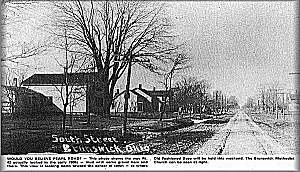 |
 |

|
and transcribed by Gerri Gornick)

|
|
Brunswick Old Fashioned Days/Sun Times Brunswick industry dates back to 1820
Industry in Brunswick dates back to 1820 when Nathan Clark and a man named Entiton owned saw mills.
The Entiton mill was operated by water from Plum Creek, which supplies Brunswick Lake.
In 1821, Isaac and Fletcher Hulet operated mills at the spot where Brunswick Lake is now, just off Center Road. Bennett and Stow had the first steam operated mill near the intersection of Pearl and Boston Roads.
What was recognized in those days as the finest mill around was the one operated by Hiram Brooks. It was situated at Bennett's Corners and was operated until the turn of the century.
Brunswick's first tannery was founded in 1838. The industry consisted of five vats about two miles north of the Pearl and Center roads intersection. Built and owned by Willis Peck, the tannery was used for dressing skins.
In the 1830s, Solomon Deming, who was one of the first settlers of Brunswick in 1815, built the first treadmill for grinding grain. The mill was near what is now the corner of Substation and Center roads.
A distillery came into being in Brunswick as early as 1828. It was on Pearl Road north of Center Road and was owned and operated by John Woodbridge.
In the 1830s, Nathan Clark also began manufacturing coffins.
 The latter part of the 19th century is only vaguely described in the histories available as to industrial progress in Brunswick. During that period, however, there were indications of chairs, table, cabinets and other useful items of household furniture being manufactured. In the late 1860s, there was an ashery manufacturing potash at Pearl and Center roads. The business was owned by Moses Bennett. Carr's Carriage and Wagon Shop stood on what is now Plaza Shopping Center on Pearl Road. High-grade carriages were built there from 1845 to about 1846. Farm produce played an important part in the development of Brunswick as well as dairy products. Sheep farming was popular in earlier years with the advent of cattle herds in the 1860s.
 Brunswick had its first creamery in 1872. It was on Center Road at about the site where Dr. Al Wolff has his Brunswick Veterinary Clinic. Records show that in 1873, the Township of Brunswick Creamery produced 62,032 pounds of better and 150,635 pounds of cheese. Local farmers could bring their milk to the creamery to have it processed. Ethey Wyman was the buttermaker and his assistant was Carl Brant. Historical accounts lead one to believe that these men were not the founders but, at the turn of the century, were the operators. In 1900, it was recorded that Brunswick had at least two cider mills. One was at the corner of Hadcock and Grafton roads and the other was owned by Lyman Chidsey and was on Sleepy Hollow Road. It was about 1900 when Ohio Fuel Gas began operating a pumping station on Boston Road, west of Pearl. From about 1890 to 1910, Harry and Arthur Aylard operated a slaughterhouse near where Conrad's Tire Service building stands near Pearl and Center roads. Harry Aylard later became a cashier of the Savings Deposit Bank in Medina and Arthur Aylard became Medina city treasurer. In 1907, Rube Marquard owned and operated a chicken farm at what is now the Sohio service station at Pearl and Grafton roads. Marquard left Brunswick on an $11,000 contract to pitch for the New York Giants. Two prominent dairy farmers in the Brunswick area in the early 1930s were Ralph Strong and C. L. Benjamin. Strong established Longview Farms in 1932. Industrial operations were somewhat dormant until about 1958 when the Clifton Concrete Co. started manufacturing cement from its Laurel Road gravel pit operations. A proposed Clifton Concrete Industrial Park never materialized. However, after Brunswick became a city in 1960, a new industrial park was created and industrial growth resumed. In 1963, the Republic Powdered Metals plant opened on Pearl Road in Brunswick Hills Township. Now known as RPM Inc., it is the world headquarters of the liquid coating products company. According to a 1985 community profile, the Brunswick-Hinckley area now has 16 manufacturing plants with total manufacturing employment of 629. The industries range from courier service to heavy equipment. Return to Index |